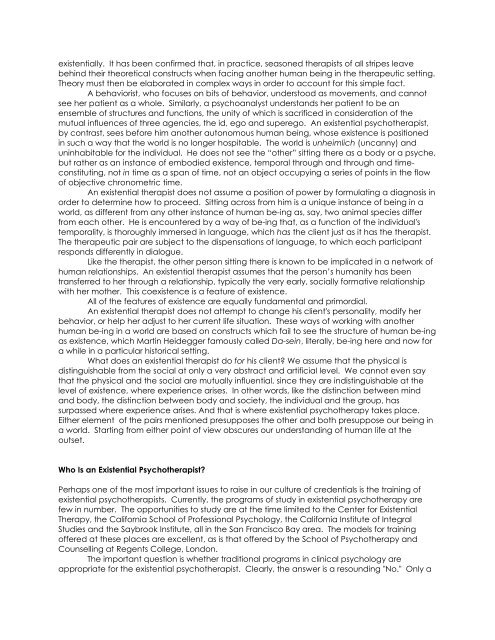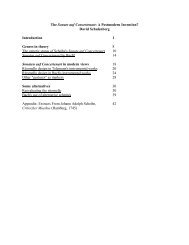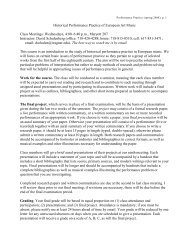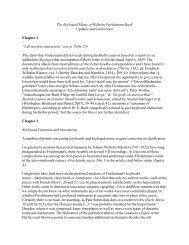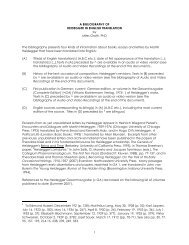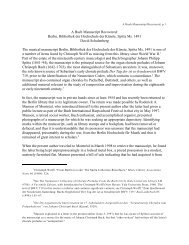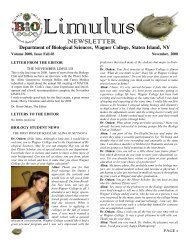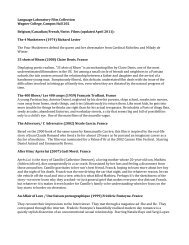SEVEN PAPERS ON EXISTENTIAL ANALYSIS ... - Wagner College
SEVEN PAPERS ON EXISTENTIAL ANALYSIS ... - Wagner College
SEVEN PAPERS ON EXISTENTIAL ANALYSIS ... - Wagner College
Create successful ePaper yourself
Turn your PDF publications into a flip-book with our unique Google optimized e-Paper software.
existentially. It has been confirmed that, in practice, seasoned therapists of all stripes leave<br />
behind their theoretical constructs when facing another human being in the therapeutic setting.<br />
Theory must then be elaborated in complex ways in order to account for this simple fact.<br />
A behaviorist, who focuses on bits of behavior, understood as movements, and cannot<br />
see her patient as a whole. Similarly, a psychoanalyst understands her patient to be an<br />
ensemble of structures and functions, the unity of which is sacrificed in consideration of the<br />
mutual influences of three agencies, the id, ego and superego. An existential psychotherapist,<br />
by contrast, sees before him another autonomous human being, whose existence is positioned<br />
in such a way that the world is no longer hospitable. The world is unheimlich (uncanny) and<br />
uninhabitable for the individual. He does not see the “other” sitting there as a body or a psyche,<br />
but rather as an instance of embodied existence, temporal through and through and timeconstituting,<br />
not in time as a span of time, not an object occupying a series of points in the flow<br />
of objective chronometric time.<br />
An existential therapist does not assume a position of power by formulating a diagnosis in<br />
order to determine how to proceed. Sitting across from him is a unique instance of being in a<br />
world, as different from any other instance of human be-ing as, say, two animal species differ<br />
from each other. He is encountered by a way of be-ing that, as a function of the individual's<br />
temporality, is thoroughly immersed in language, which has the client just as it has the therapist.<br />
The therapeutic pair are subject to the dispensations of language, to which each participant<br />
responds differently in dialogue.<br />
Like the therapist, the other person sitting there is known to be implicated in a network of<br />
human relationships. An existential therapist assumes that the person’s humanity has been<br />
transferred to her through a relationship, typically the very early, socially formative relationship<br />
with her mother. This coexistence is a feature of existence.<br />
All of the features of existence are equally fundamental and primordial.<br />
An existential therapist does not attempt to change his client's personality, modify her<br />
behavior, or help her adjust to her current life situation. These ways of working with another<br />
human be-ing in a world are based on constructs which fail to see the structure of human be-ing<br />
as existence, which Martin Heidegger famously called Da-sein, literally, be-ing here and now for<br />
a while in a particular historical setting.<br />
What does an existential therapist do for his client? We assume that the physical is<br />
distinguishable from the social at only a very abstract and artificial level. We cannot even say<br />
that the physical and the social are mutually influential, since they are indistinguishable at the<br />
level of existence, where experience arises. In other words, like the distinction between mind<br />
and body, the distinction between body and society, the individual and the group, has<br />
surpassed where experience arises. And that is where existential psychotherapy takes place.<br />
Either element of the pairs mentioned presupposes the other and both presuppose our being in<br />
a world. Starting from either point of view obscures our understanding of human life at the<br />
outset.<br />
Who Is an Existential Psychotherapist?<br />
Perhaps one of the most important issues to raise in our culture of credentials is the training of<br />
existential psychotherapists. Currently, the programs of study in existential psychotherapy are<br />
few in number. The opportunities to study are at the time limited to the Center for Existential<br />
Therapy, the California School of Professional Psychology, the California Institute of Integral<br />
Studies and the Saybrook Institute, all in the San Francisco Bay area. The models for training<br />
offered at these places are excellent, as is that offered by the School of Psychotherapy and<br />
Counselling at Regents <strong>College</strong>, London.<br />
The important question is whether traditional programs in clinical psychology are<br />
appropriate for the existential psychotherapist. Clearly, the answer is a resounding "No." Only a


